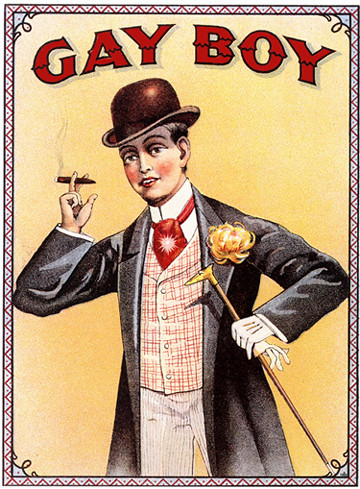 |
| Old cigarette ad rendered confusing by new euphemism. |
A correspondent recently wrote, in response to a column by my columnist friend Xerxes, “I find it amazing that in this age people do not understand that our sexuality is not chosen, but part of the genetic package we are born with.“
Here is another of those things that “everybody knows” that are not true. Generally deliberately planted for political purposes.
In the 1980s and 90s a notion reached its peak that human behaviour could be explained genetically. I guess the “gay gene” was the leading factor, but alcoholism, depression, schizophrenia, bipolar disorder, and all sorts of other things were also posited to be genetic. Among other advantages, this let a lot of people off the moral hook: either for indulging vices, or for driving others mad. So it was an easy sell to the popular culture.
It was always ever a speculation, mostly wishful thinking, but it was seized upon and presented as an established scientific fact. Periodically, The papers even announced that a “gene for schizophrenia” or “gay gene” had been discovered. But none of those studies could ever be reproduced. Unfortunately, the first claimed discovery was news. The later retraction was not. Many people have been left with the impression that the science is settled.
As time marches on, with many researchers searching for these genes, and as our knowledge of the human genome grows exponentially, we still have not discovered any of these genes. It grows increasingly likely that they do not exist.
Gee—people are not robots. Who knew?
The “gay gene” although always the most popular of these hypotheses, was also always the least probable. For a “gay gene” to exist, Darwin would have to have been nuts. No small issue. If natural selection is real, any gay gene would have died out in a single generation. It would prevent reproduction. Bad evolutionary strategy.
The “gay gene” became popular dogma largely because many believed it gave “homosexuals” an inalienable right to homosexual sex. One was born gay like one was born black. So objecting to gay sex was simply prejudice.
Given that only perhaps 3% of the population has any interest in having gay sex, why did this become such a popular issue?
Because it meant that conventional moral codes, notably Catholicism, were guilty of prejudice. So, presumably, they could be ignored, discarded, and everyone could do what they want. Most notably, I suspect, abort unwanted children, allowing unrestricted sex without responsibility.
At the expense of accepting that you were an animal, or a robot. For some, a small price to pay.
So if it is not genetic and inborn, how does one become gay? After all, the great majority of us have no temptation at all in that direction. Quite the reverse.
If one is not “born that way, the obvious alternative is nurture. Opening up a disturbing possibility. What if a desire for gay sex is triggered by a nearly gay experience? That seems entirely plausible. How many of us, after all, spend the rest of our lives until marriage looking for someone who reminds us of our first girlfriend? After all, how are we to explain other sexual fetishes? Can you be born with a sexual attraction to shoes, or to uniforms?
In other words, people may become gay because they were “groomed,” seduced into a homosexual experience at a young age.
This seems to have been the conventional wisdom, until recently, about homosexuality and how it came about until quite recently. In ancient Greece, an older man would recruit a young male lover. In English public schools, an upperclassman would recruit a younger “fag.”
So what if our ancestors were right?
Homosexuality, if there is a choice, is both socially and individually desirable. Most notably because it does not lead to children. Also because it seems to be an efficient way to spread disease. But it also cannot be a pleasant life to be sexually attracted to people 97% of whom are going to reject your advances out of hand.
So what is the obvious solution? The temptation must be very great to seek out a younger person, someone quite inexperienced, barely aware of what sex is about, and in any case smaller, weaker, and socially less powerful than yourself, and lure then into an encounter.
And now one begins to see why homosexuality has traditionally been prohibited in almost all cultures.
The issue is not really sex between two consenting adults. Even where the prohibition still applies, in countries like Saudi Arabia, that seems to be nobody's business. It is the automatic probability of what we now call “hebephilia.”
The modern concept of taking homosexuality out of the closet, and recognizing gay marriage, may be a viable and more humane alternative to banning it: make it easier for gays to find partners, and there will be less incentive to hunt among the young.
But let's see things as they are.












No comments:
Post a Comment